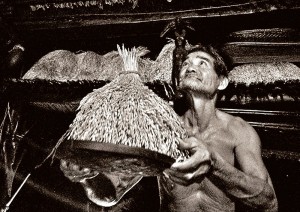Celebrating indigenous wisdom and knowledge

YOUNG AND OLD residents of Hungduan, Ifugao, gathered in a river in August to join native games, like “guyyudan” (tug-of-war), in celebration of a good harvest. PHOTOS BY EV ESPIRITU / INQUIRER NORTHERN LUZON
A story was told about a team of city-bred researchers who wanted to know how the Aeta people were coping after Mount Pinatubo erupted in 1991. After an hour of uphill trek, the researchers, along with a tribal elder as guide, chanced upon some wild guava trees with ripe fruits.
Excited with what they saw, they stopped and had a field day munching on the ripe guavas. After they had their fill, they harvested more, filling their pockets and bags. To their surprise, however, the Aeta guide picked only a couple to eat.
When they asked why he ate only two despite the abundance, the elder said: “There would be many travelers passing through this trail so it would be good to leave some for them.”
Often told and retold in many conferences, the story has become a classic illustration of indigenous wisdom, which is usually cited during the celebration of the Indigenous Peoples’ Month every October and in some homilies delivered by priests and pastors.
It has become a metaphor for two distinct paradigms—one represented by the team of “schooled” (and thus Westernized) researchers and the other represented by the “unschooled” guide, who has learned and kept the wisdom of his ancestors.
The first is based on consuming and amassing more than what one needs, while the other is based on knowing one’s basic needs and having a deep concern for others, including those of the next generations. The latter perspective is largely cultural or a way of life, which is deeply rooted in indigenous peoples’ belief and value system.
Principle of ‘enough’
In June, anthropologist Katrin de Guia and her husband, filmmaker Kidlat Tahimik, convened an international conference in Baguio City, which brought together members of 25 indigenous groups from around the Philippines and guests from other countries, like American Indians, Karens from Thailand and Ainus from northern Japan.
It was the third conference that the couple organized since 2008. The participants not only celebrated their native talents but also highlighted their conservation wisdom and philosophies.

A FARMER in Barangay Batad in Banaue, Ifugao, stores newly harvested rice and seedlings at his rice granary for next year’s planting season.
For example, in contrast to the “greed-as-driver-for-economic-growth” model, the indigenous peoples stressed the principle of “enough.” Through epics and stories, they highlighted the wisdom of leaving something for the coming generations as opposed to “maximizing production” preached by many corporations.
Not hunting pregnant or young deer or wild pigs, or observing an off-season for fishing were among the many stories shared during the conference.
The meeting also became a venue for Filipino academicians, many of whom took postgraduate studies in the United States, to pay tribute to their indigenous brothers and sisters for continuing their role as keepers of the traditional wisdom of their ancestors.
One woman participant from Pampanga even made an emotional public apology to the Aeta community. Owing to her “colonial education,” she confessed that indirectly and unwittingly, she was part of the whole process that disenfranchised the Aeta people from their ancestral domain, which, she said, included the once US-controlled Subic Naval Base in Zambales and Clark Air Base in Pampanga.
Recently, Tahimik said he was asked by Department of Education (DepEd) officials to help them work out the integration of “schools of living tradition” into the public school system. The schools are community-based institutions where indigenous youths learn from their elders important values and principles, along with epics, rituals, belief systems, songs, dances and crafts.
While long overdue, Tahimik welcomed the DepEd’s efforts to integrate indigenous knowledge and recognition of mother tongues as instruction media.
“[These may yet help] repair the damage brought about by our colonial education,” he said. “It is time we stop marginalizing indigenous knowledge.”














